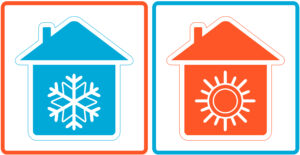
If you have some familiarity with the heat pump, then you know that the major advantage of this comfort system installation is that it can operate as both a cooling and heating system. A heat pump is similar to a refrigerant-based air conditioner: it circulates refrigerant between two sets of coils, evaporating refrigerant in one coil to absorb heat and condensing the refrigerant in the other coil to release that heat.
What makes a heat pump different from an AC is that it can change the direction it circulates refrigerant, causing the two coils to swap functions. An air conditioner can only move heat from inside the house to outside. But a heat pump can reverse the way it runs so that it moves heat from the outside to the inside. All it takes is an adjustment on the thermostat for the cooling system to become a heating system.
But this leads to an obvious concern … does this actually work in cold weather to make a viable choice for a year-round West Chester, PA, HVAC system?
“Where is the heat coming from?”
We understand why you may be skeptical about whether a heat pump can handle a Pennsylvania winter. When in heating mode, a heat pump draws on heat from outside and moves it inside. But where is it getting this heat, since the heat pump only runs in heating mode on cold days?
The answer is there is always heat energy available, no matter how cold it gets outside. As long as the refrigerant moving through the outdoor coil of the heat pump is colder than the air moving around it, it will evaporate and absorb heat energy to move indoors. The newest heat pump technology can handle extremely cold temperatures without suffering from a plunge energy efficiency.
But … efficiency drops can still occur
A heat pump can run into conditions where the temperature outdoors is so low that the system struggles to draw in enough heat. This usually occurs with temperatures below 25°F. The heat pump won’t stop heating the house at this point, but it will consume more energy to do the job. Fortunately, heat pumps generally consume less power to run than an electric furnace, so the expense to run a heat pump during a whole winter is often the less expensive choice.
Hybrid heating
You have options to help a heat pump during extreme cold temperatures, such as a supplemental gas furnace that comes on with the heat pump’s efficiency declines. This type of system is known as a dual-fuel or hybrid heat pump, and it offers a best-of-both worlds for homes that might otherwise find a heat pump insufficient.
We can help you choose
The best way to determine if a heat pump is an ideal HVAC installation for your house—both for heating and cooling—is to work with our skilled professionals. We can determine how well a heat pump will work and how much you may potentially save with one. Trust us to deliver the answers you need.
Michall Daimion Heating & Air Conditioning, Inc. has been the Main Line’s Premier Service Provider since 1976. Schedule your comfort needs with our team.
